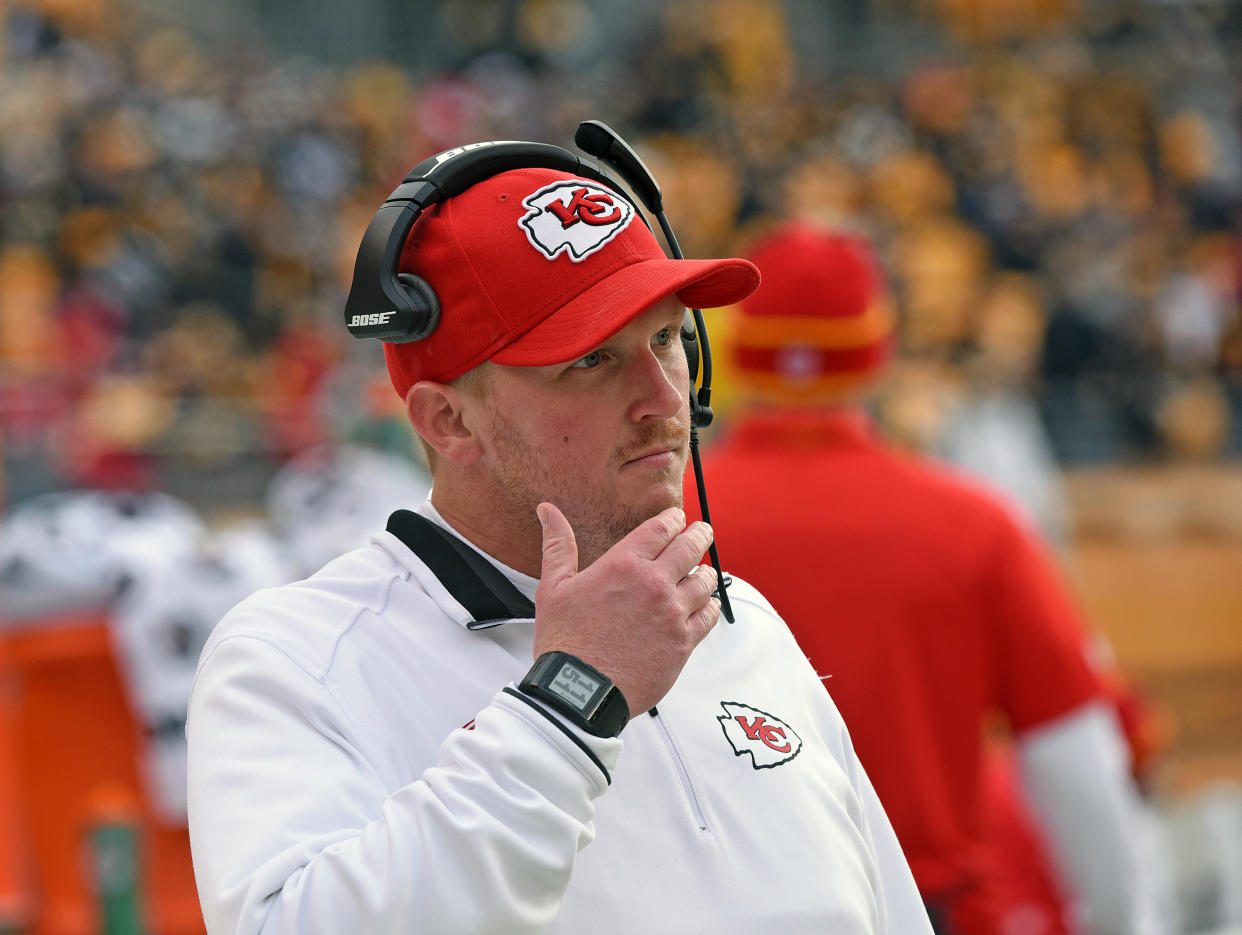Court transcript confirms ex-Chiefs assistant Britt Reid was drinking at team facility prior to DWI accident
Last month, in a downtown Kansas City courtroom, Britt Reid, the son of Chiefs head coach Andy Reid and a former assistant coach for the team, pleaded guilty to felony DWI that resulted in an accident that seriously injured multiple people, most notably then-5 year old Ariel Young who still struggles in her recovery.
As part of the process, Reid stood, and under oath, answered questions from his attorney J.R. Hobbs, including, for the first time publicly, his whereabouts just prior to the crash. Namely, at the Chiefs football facility.
“On February 4th, 2021, were you present at Arrowhead Stadium?” Hobbs asked.
“Yes, sir,” Reid answered.
“Was there a point in time when you began driving home around 9 p.m.?” Hobbs asked.
“Yes,” Reid answered.
Moments after leaving Arrowhead, Reid, with a blood alcohol concentration of .113, sped his Dodge Ram truck 84 miles an hour down an Interstate 435 on ramp where he slammed two cars sitting in the breakdown lane. Young, whose mother had driven over to help a relative with car trouble, was seated in the backseat of one of the vehicles. She spent weeks in a coma and even as she has recovered enough to go to school, is likely to be affected for the rest of her life.
Last year, the Chiefs made a deal with Young’s family to provide medical care and “long-term financial stability,” according to family attorney Tom Porto.
Reid was hospitalized from the crash and immediately suspended by the team. He missed the Chiefs' loss to Tampa Bay in the Super Bowl a few days later. His contract was not renewed.
Friday, the 37-year-old was expected to be sentenced to four years in prison. A scheduling issue has pushed the sentencing to Tuesday. Young’s family is not pleased with what they believe is a short sentence and are expected to appeal to the judge for longer.
While sentencing will bring an end to the criminal case, Reid’s admission of being at the Chiefs facility that sits adjacent to Arrowhead Stadium prior to the crash renews a pertinent question that neither the Chiefs nor the NFL appear interested in addressing.
What was happening that day at the facility? Was Reid drinking alone? With others? Did he hide it? Was it out in the open? Did anyone worry about a life-long abuser using alcohol? Is drinking on the job prevalent there?
The Chiefs originally stated they were “in the process of gathering information” but have since offered no comments on what that process entailed or what, if anything, was found.
Meanwhile, the NFL initially stated that “the matter will be reviewed under the NFL’s personal conduct policy.” Yet nothing about the review of a coach drinking on the job before a horrific incident was released publicly, even though similar investigations into player conduct often are. The league did not respond to requests for comment this week.
It seems like everyone wants it to just go away.

For nearly two years, both the team and the league could hide behind the fact no one knew for certain where Reid had gotten drunk.
The obvious assumption has always been that it happened inside the Chiefs football facility. The crash scene was around a half mile from the team’s offices and the direct route Reid, who lived in Overland Park, Kansas, would logically take to get home. There are no bars or restaurants on the way. He wasn’t allowed in such places anyway at the time due to the NFL COVID-19 protocols of the 2020 season.
However, there was no public confirmation until the plea hearing in September. Hobbs, Reid’s attorney, declined further comment this week but pointed to Reid’s sentencing memorandum that was filed last Friday.
It repeatedly made it clear that Reid was drinking at work.
“Mr. Reid departed from his place of employment, Arrowhead Stadium in Jackson County, around 9 p.m. on February 4, 2021, and began driving home,” it stated at one point.
In another: “He acknowledges operating a vehicle while under the influence of alcohol as he attempted … to return home from his workplace.”
The Chiefs and the NFL almost certainly knew all of this within hours of the crash. NFL facilities have significant security and surveillance. Under COVID protocols, the league installed even more cameras in an effort to monitor and discover any COVID distancing violations.
Everyone inside the facility that day was, presumably, a Chiefs employee and available for interviewing.
Yet did anyone ask? Did anyone — in Kansas City or the league office in New York — even care to ask?
This was, of course, an at-risk employee. Reid had been in and out of treatment for years. In 2007, he was sentenced to 23 months in prison for a road rage incident in Philadelphia, where, at the time, his father coached the Eagles (he was paroled into a treatment center). There was also a separate guilty plea on DUI and drug charges stemming from him driving his car into a shopping cart in Pennsylvania.
If not for nepotism, there is no way someone with his background, let alone thin coaching résumé, would have scored a coveted NFL assistant job.
Britt Reid was a ticking time bomb on the people of Kansas City. It eventually blew.
The Chiefs are paying Ariel’s bills, but the public has no idea about any other culpability, procedures or mistakes. Britt Reid will go away for a while, although not as long as the victims want.
The story will likely drift off into history.
That’s how the NFL wants it.
The league, which relentlessly pursues player conduct, doesn’t seem to care or care to know what is happening when it comes to coaches engaging in dangerous criminal behavior, even right there inside its very own buildings.
